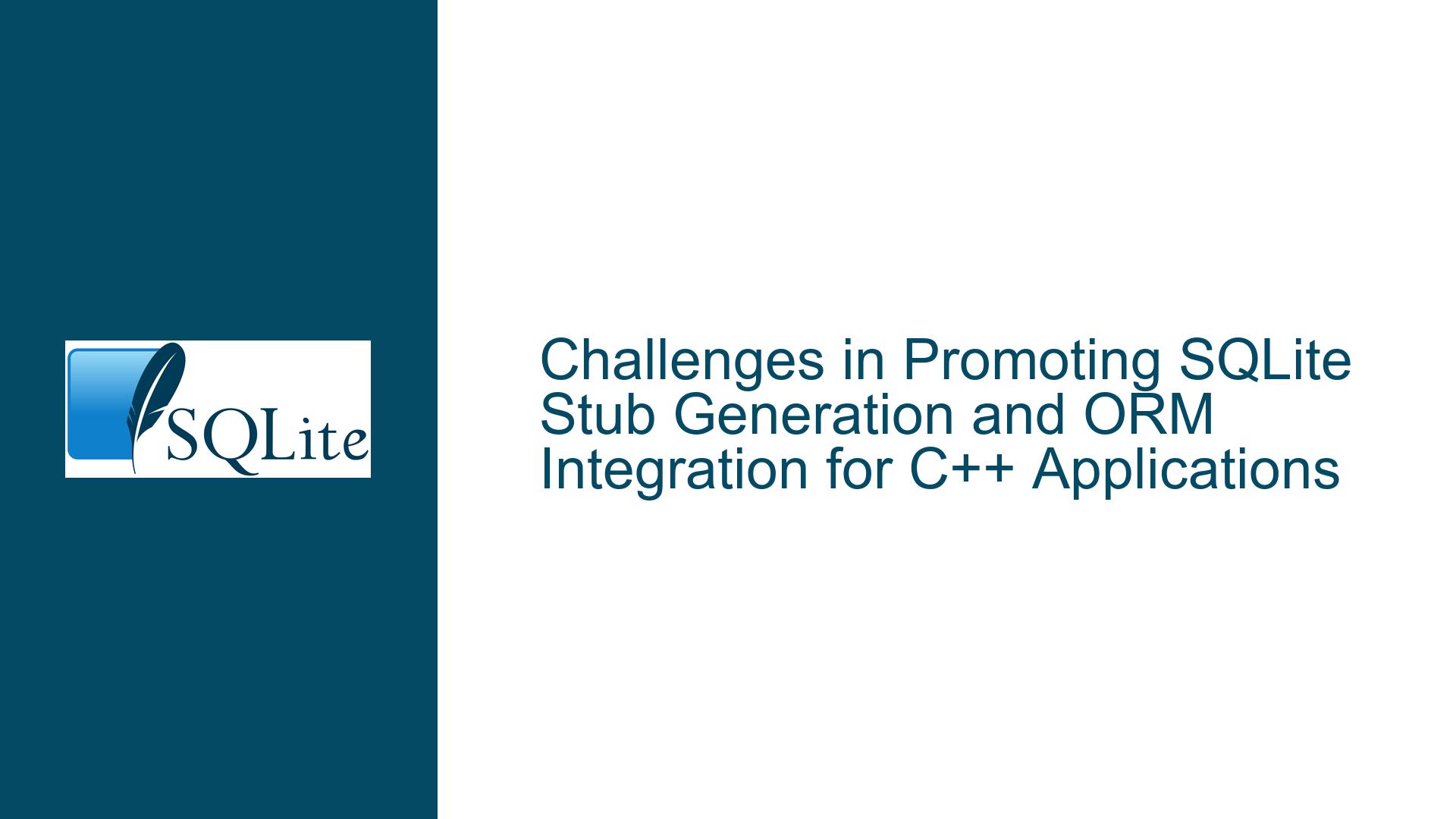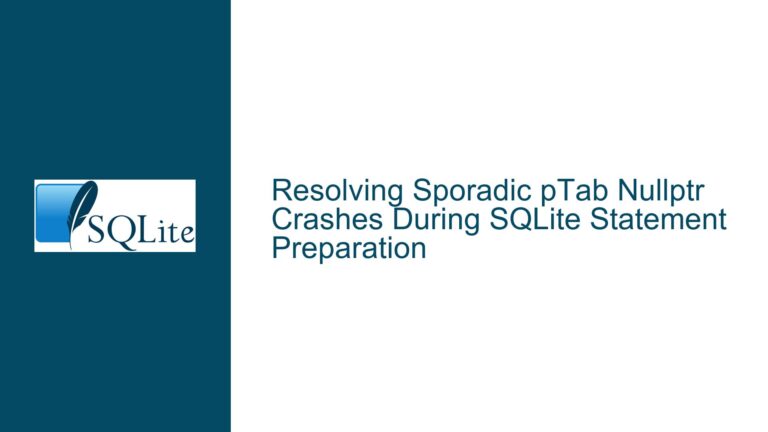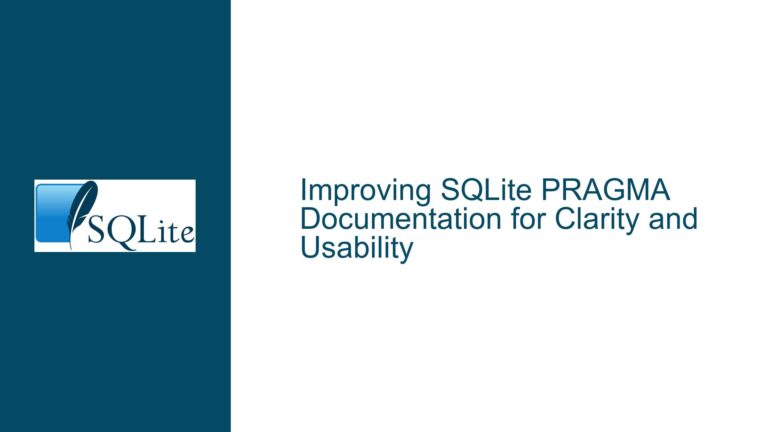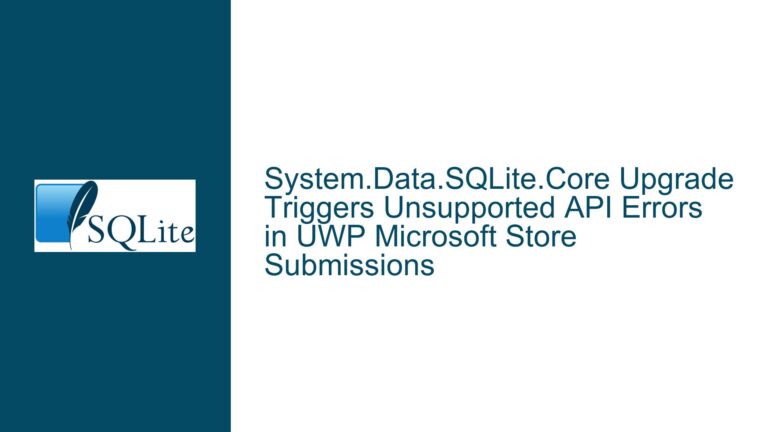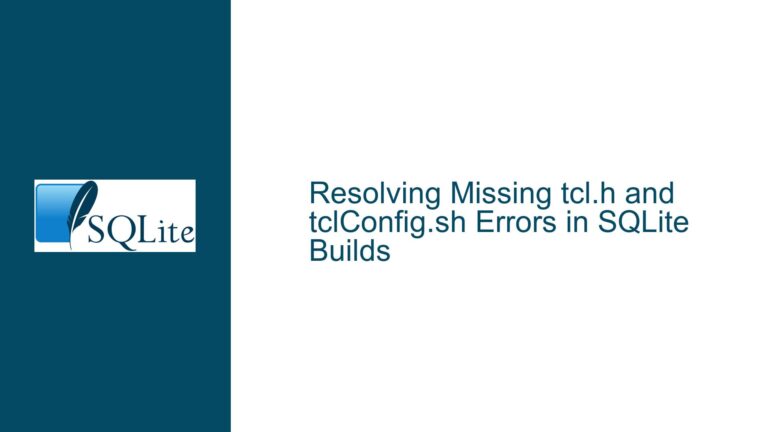Challenges in Promoting SQLite Stub Generation and ORM Integration for C++ Applications
Understanding the Integration Challenges of SQLite Stub Generation and ORM in C++
The development of tools like sqlite_stub_maker and sqlite_wrapper aims to streamline SQLite integration with C++ applications by automating database stubs and ORM (Object-Relational Mapping) code generation. However, promoting such add-ons requires addressing technical, architectural, and community-related challenges inherent to the SQLite-C++ ecosystem. SQLite’s lightweight, serverless architecture makes it ideal for embedded systems and small-scale applications, but its lack of native ORM support creates friction for developers accustomed to frameworks like Hibernate (Java) or Entity Framework (C#). The sqlite_stub_maker tool attempts to bridge this gap by generating database schemas and ORM mappings from SQL scripts and XML configurations, while sqlite_wrapper serves as an intermediate layer to abstract SQLite’s C API into a C++-friendly interface. Despite their technical merits, these tools face adoption barriers due to the fragmented nature of C++ build systems, competing ORM libraries, and the absence of centralized channels for SQLite extension promotion. Developers often struggle to justify migrating from established workflows to new tools without clear evidence of performance gains, reduced boilerplate, or cross-platform compatibility. Furthermore, the reliance on XML for ORM mappings may conflict with modern C++ practices favoring header-only libraries or compile-time code generation. These factors create a complex landscape where technical innovation must align with practical usability and discoverability.
Identifying Barriers to Adoption and Visibility for SQLite Add-Ons
The challenges in promoting sqlite_stub_maker and sqlite_wrapper stem from four primary areas: technical integration complexity, documentation gaps, community perception, and market saturation. First, the C++ ecosystem lacks a unified package manager, forcing developers to manually integrate third-party libraries or rely on platform-specific solutions like vcpkg or Conan. This complicates dependency management for sqlite_wrapper, which must coexist with existing SQLite installations and other ORM libraries. Second, the learning curve associated with XML-based ORM mappings may deter developers accustomed to annotation-driven or template-based approaches. While XML offers flexibility, it introduces additional build steps and potential for configuration errors. Third, SQLite’s reputation as a "simple" database often leads to underestimation of its capabilities, resulting in fewer developers actively seeking advanced tooling. Competing lightweight databases (e.g., DuckDB) or ORM frameworks (e.g., SQLiteCpp) further fragment the market. Fourth, the absence of a centralized marketplace for SQLite extensions forces developers to rely on GitHub searches, forums, or word-of-mouth, making it difficult for niche tools to gain visibility. Technical barriers such as incomplete CMake support, lack of IDE integration, or insufficient error handling in generated code exacerbate these issues. For example, if sqlite_stub_maker produces C++ code that triggers compiler warnings or violates modern standards (e.g., raw pointer usage), developers may abandon the tool despite its theoretical benefits. Additionally, performance overhead introduced by the sqlite_wrapper layer—such as runtime type conversions or virtual method dispatches—could negate SQLite’s efficiency advantages, discouraging adoption in resource-constrained environments.
Strategies for Effective Promotion and Technical Optimization of SQLite ORM Tools
To overcome these barriers, a multi-pronged approach combining technical refinement, community engagement, and strategic marketing is essential. Begin by auditing the generated code from sqlite_stub_maker for compliance with modern C++ standards (C++17/20), ensuring compatibility with major compilers (GCC, Clang, MSVC) and build systems (CMake, Bazel). Replace XML-based ORM configurations with a declarative DSL (Domain-Specific Language) or compile-time code generation using templates or constexpr to align with contemporary C++ practices. For sqlite_wrapper, minimize abstraction overhead by leveraging RAII (Resource Acquisition Is Initialization) for connection management and std::variant for type-safe parameter binding. Publish benchmark comparisons against raw SQLite3 API usage and competing libraries (e.g., SOCI, sqlite_orm) to quantify performance benefits. Create a comprehensive documentation portal featuring tutorials, API references, and troubleshooting guides, hosted on GitHub Pages or ReadTheDocs. Develop a sample application showcasing end-to-end usage, such as a task manager or inventory system, with step-by-step deployment instructions for Windows, Linux, and macOS. Engage the SQLite and C++ communities by presenting at conferences (CppCon, C++Now), publishing technical articles on platforms like Medium or Dev.to, and participating in forums (Stack Overflow, Reddit’s r/cpp). Submit sqlite_wrapper to package managers (vcpkg, Conan) to simplify installation. Collaborate with open-source projects reliant on SQLite to demonstrate real-world use cases. Finally, leverage GitHub’s visibility features—pin repositories, enable GitHub Discussions, and tag projects with relevant topics (sqlite, orm, cpp). Address security concerns by implementing fuzz testing for generated code and achieving OSS-Fuzz integration. By aligning technical excellence with community-centric outreach, these tools can carve a niche in the SQLite-C++ ecosystem.
